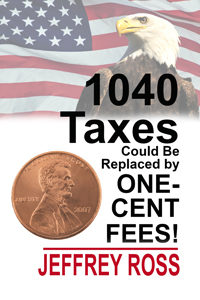Taxes: #Nonfiction#BusinessEconomics
This book proposes a one-cent fee on all electronic financial transfers using ACH and point-of-sale purchases to replace 1040 income taxes.
1040 Taxes: Business

Buy at: Amazon, Barnes and Noble
BLURB: 1040 Taxes
1040 culture—like it or not—exists because the United States government taxes personal income to raise trillions to fund the federal treasury. This amount will undoubtedly increase in the future—but so will American commerce and the GDP. The focus of this book will be how we can raise 3.5 or 5.0 or 6 trillion dollars efficiently and accurately while eliminating the unwieldy 1040 tax return process. The TFP plan, basically, is to “automatically” assess a 1 cent fee (.01 dollar) on all trackable transactions in the US (or related international transactions using American financial institutions). Say good bye to tax preparation, deductions, refunds, credits—this will be a pay-as-you-go system. Tax audits and tax-related stress will become history.
EXCERPT: 1040 Taxes Could Be Replaced by One-Cent Fees
As stated earlier, it is very difficult to let go of the archaic notions of withholding, itemization, deductions, and Schedule A’s. The refund event is unbelievable. I am amazed American taxpayers are so happy to get a two or three-hundred-dollar refund—when thousands and thousands of dollars have been withheld from their paychecks for the entire year! Possibly some of you are convinced there is a moral obligation to pay taxes. In my opinion, morality or immorality has nothing to do with funding the government. My concern in this book is only how relatively painless mathematical efficiency can be applied to fund the Treasury. This proposal is about dollars and cents—especially the cents. And common sense!
Well-meaning folks have said my plan is unrealistic or unfair. As I will point out continually, fairness has nothing to do with this plan. I would challenge any of you to explain how the current system, the current Code, is fair—or consistent—or accurate—or simple. By the way, politics has nothing to do with this new proposal.
My new system for funding the US Treasury, The Transaction Fee Protocol (known hereafter as TFP) is based on mathematics, is not political, will generate sufficient funds, and is simple to articulate and conceptualize. Fully “automatic,” the TFP will work because the software architecture already exists to support its implementation. Fantasy football, cash registers, ATM’s, Amazon—all function daily using 21stcentury tracking technology.
This plan is not related to any state income tax, sales tax, property tax, Social Security tax, Medicare tax, or corporate income taxes—although the TFP will collect monies from corporations as well. (However, simple adjustments to TFP fees could also be used to potentially fund national health care, higher education, and Social Security. More on other possibilities later.)
This proposal moves forward from a very simple observation—1040 culture exists because the United States government taxes personal income to raise trillions of dollars to fund the federal treasury. The amount will undoubtedly increase in the future—but so will American commerce and the GDP. I have nothing against the IRS or the giant cottage industry populated by tax interpreting and preparing professionals. Unfortunately for tax preparers, many of their accounting services will no longer be needed within the TFP universe. This new plan will provide a valuable place for the IRS. (It will become the “New IRS,” or “NIRS,” under the TFP system—a purpose-focused agency explained below.) But the essential focus of this book will be how we can raise 3.5 or 5.0 or 6 trillion dollars efficiently and accurately while eliminating the unwieldy and often suspect 1040 tax return process. I am not concerned with the future careers of tax preparation professionals.
A trillionis 1 followed by 12 zeros—1,000,000,000,000. This is, of course, a very large number. The TFP plan, basically, is to “automatically” assess a one-cent fee (.01 dollar) on all trackable transactions in the US (or those related international transactions using American financial institutions). To raise 4 trillion dollars assessing one-cent per transaction, 100 X 4,000,000,000,000 transactions will need to occur per annum. Is it possible? I believe so, and you will too.
I came upon this “idea” while examining electricity consumption by American homes.
According to the US Energy Information administration, the total sales of electricity to all sectors of consumers (residential, commercial, transportation, and industrial) was 3,758,992,000,000kWh’sin 2015. Think of this—a one-dollar surcharge (or fee or tax) on each of the kWh’s would have paid the 1040 tax bill for the entire country! Of course, no individual wants to pay such a fee. But what if fees were spread out into the network of electronic commerce?
What about a simple one-cent fee/charge on every financial transaction taking place within a calendar year? Billions and billions of transactions take place daily in the USA. I predict sufficient annual transactions occur in five major areas of the American economy to successfully replace the need for personal income taxes in the US (using the one-cent per transaction rate). These five sectors include Financial Services, Equity Markets, Energy, Retail Sales, and Transportation.
Examples and statistics from each are described below. I will not provide exhaustive lists of transactions. The New IRS will be charged with finding, monitoring, and validating appropriate transactions—and setting up the processes for channeling TFP monies into the federal treasury.
But the proposal provides stunning documented figures, which clearly support the veracity and simplicity of this plan. As a side note, I might mention it is quite difficult to find simple count numbers describing transactions involving some aspects of our economy. Growth and economic numbers are typically reported as per cent changes or dollar amounts—not in customer counts or retail sales transactions. However, I will supply sufficient information to clearly articulate the evidence supporting these ideas—and whet the reader’s appetite for absolute reform of the current federal personal income tax process.
Author Bio
Jeffrey Ross, who resides in Arizona, is a writer, rock musician, and former full-time community college teacher. He has had four “Views” pieces published on InsidehigherEd.com, has authored and co-authored several national and international op-ed articles on community college identity, purpose, and culture, and has recently published numerous parody poems and articles on the Cronk News higher education satire website. Ross co-authored the comic and critically acclaimed campus novel College Leadership Crisis: The Philip Dolly Affair (Rogue Phoenix Press, 2011). He also authored the romance parody Love in the RV Park: A Romance for Men(Rogue Phoenix Press, 2013), a nonfiction life history Silent Sonora (Rogue Phoenix Press 2015), and the mature romance The Auroran: Cold Front Redemption(Rogue Phoenix Press 2016).
KEYWORDS
IRS, income taxes, tax reform, tax preparation, 1040 forms, flat tax, VAT tax
SOCIAL LIINKS
Facebook page: https://www.facebook.com/salinas.chick
Twitter handle: @salinaschick




Welcome to my blog.